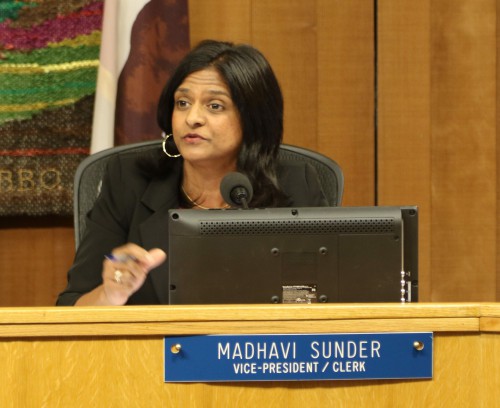

By Nicholas von Wettberg
Moments after holding its annual reorganization meeting, with an election of officers, the Davis Joint Unified School District (DJUSD) Board of Education was briefed on efforts to implement a later start policy.
The district began the exploratory process into a revamped schedule earlier this year, with tentative plans for secondary schools to eventually push back starting times half an hour, to 8:30 am.
Associate Superintendent of Administrative Services Matt Best presented the item update, beginning his report at Thursday night’s meeting with an explanation for the project’s impetus, which he said is one way for teens to receive the appropriate amount of sleep.
“And there are pretty dire health consequences both for learning and also other health-related issues for lack of sleep,” Best said. “And that’s really the driving force behind the board’s direction and the AAP’s recommendation that teens get adequate sleep.”
In doing their research, which included combing over recent studies by the American Academy of Pediatrics and the University of Minnesota correlating adolescent brain function to amount of sleep, he said the staff identified multiple benefits and challenges to the system.
The points of interest were narrowed down to education, measurement and scheduling, so in order to learn more the district staff formed a subcommittee for each area of focus.
Best pointed out that the scheduling subcommittee has been the busiest of the three.
“Really, we’ve done a ton of work there exploring different areas of potential action, gathering stakeholder input and trying to whittle down those areas that we might potentially focus on,” said Best.
Perhaps the group with the biggest challenge, however, is the one faced with educating the public (parents, students, staff, community) on the facts behind teens and sleep, and the reason why a later start to school can benefit the overall health, education and safety of teens.
Along with the creation of a Later Start Facebook campaign, the educational subcommittee has reached out for the services of noted experts in the field like Harvard sleep specialist Dr. Chuck Czeisler, who spoke on the subject at a recent parent/student forum.
The measurement group administered a baseline survey for the hours of sleep students receive each night, and they plan on working off those numbers in the future.
Items on the periphery of school start time, like grade level configurations, homework policy and course offering were eliminated from the discussion, according to Best.
One aspect of the report that reappeared in the conversation was the concept of co-enrollment, and the nexus between secondary and elementary schools.
These age appropriate differences are part of the master schedule, which according to Best will be worked out starting in February.
In the past, junior high school students wanting to take a class in one of the five languages offered have had to travel to the senior high schools.
What the district recommends is that the co-enrollment format be redesigned to stay in-house, and phased-in for 8th graders who plan on sticking with the particular language of study.
The initial timeline for implementation is the beginning of 2017-18 school year, although Best explained to the board that the process could be accelerated if they are able to build consensus for critical mass.
In the end, it was trustee Tom Adams who made the motion for the item and it was seconded, passing unanimously, but the decision was made with an apparent sense of reservation – not because of the plan itself, but because of the timeline, and the addition of a 14-month trial period for the district’s senior high schools.
The apprehension, exhibited by all five members, was that the process might take on a life of its own, and stretch way past the projected target date.
Board member Susan Lovenburg, who commented that there should be a sense of urgency in expediting the project, said that she’d “hold the line on a recommended timeline.”
In the yearly reshuffling of the school board, Madhavi Sunder replaces former president Alan Fernandes. The new vice president/clerk is Barbara Archer.